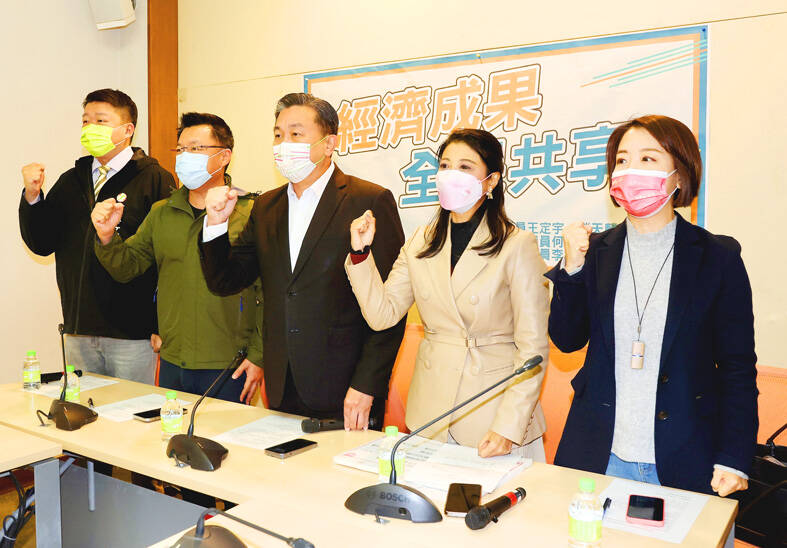The government might issue vouchers to redistribute this year’s surplus tax revenue, the Ministry of Finance said yesterday following a call from lawmakers.
Lawmakers on the legislature’s Finance Committee asked Acting Minister of Finance Frank Juan (阮清華) about the possibility of redistributing surplus tax revenue.
Juan said a redistribution scheme would have to undergo legislative review, so it would be easier to issue vouchers similar to the stimulus vouchers issued to encourage consumer spending during the COVID-19 pandemic.

Photo: CNA
Although tax revenue exceeded the general budget planned for this year, it fell into a deficit when special budgets were taken into consideration, he added.
As such, redistributing the surplus could increase the government’s debt burden and should be carefully deliberated, he said.
Juan promised to bring the issue to the Executive Yuan and discuss it with government agencies.
Separately, Democratic Progressive Party (DPP) legislators Wang Ting-yu (王定宇), Chao Tien-lin (趙天麟) and Michelle Lin (林楚茵) from the party’s Taiwan Forward faction proposed at a news conference ways to return the surplus tax revenue to the public.
Tax revenue in the first 11 months of this year exceeded NT$3 trillion (US$97.69 billion) for the first time, and by the end of the year might exceed the planned budget by NT$450 billion, they said.
The government should return the surplus to the public in cash or voucher form before the Lunar New Year holiday next month, they said.
It should also provide debt relief to 840,000 students in Taiwan and offer further economic relief packages to traditional industries, which were affected the most by COVID-19, they said.
Although Taiwan’s overall economic situation has ostensibly been good during the pandemic, that might only be the case for specific industries such as semiconductors and technology, Wang said.
Traditional industries, including service providers, caterers and food markets, have been struggling, he added.
Many people have complained to Vice President William Lai (賴清德) at local forums that the government’s economic relief packages came with too many limitations and inconveniences, Chao said.
The tax surplus mainly came from corporate income taxes, Lin said, adding that large companies performed well during the pandemic and their factories managed to deliver products on time.
However, the food industry, and small and medium-sized enterprises have been negatively affected by the pandemic, she said.
Former New Taipei City councilor Ho Po-wen (何博文) and former Hsinchu City councilor Lee Yen-hui (李妍慧) of the DPP urged the government to share the surplus with the public so that people can enjoy the Lunar New Year.
Later yesterday, Executive Yuan spokesman Lo Ping-cheng (羅秉成) said that President Tsai Ing-wen (蔡英文) would convene a national security meeting to discuss the issue based on the economic conditions at home and abroad.
The Executive Yuan would make an announcement as soon as a concrete policy is formulated, he added.

Taiwan is gearing up to celebrate the New Year at events across the country, headlined by the annual countdown and Taipei 101 fireworks display at midnight. Many of the events are to be livesteamed online. See below for lineups and links: Taipei Taipei’s New Year’s Party 2026 is to begin at 7pm and run until 1am, with the theme “Sailing to the Future.” South Korean girl group KARA is headlining the concert at Taipei City Hall Plaza, with additional performances by Amber An (安心亞), Nick Chou (周湯豪), hip-hop trio Nine One One (玖壹壹), Bii (畢書盡), girl group Genblue (幻藍小熊) and more. The festivities are to

Auckland rang in 2026 with a downtown fireworks display launched from New Zealand’s tallest structure, Sky Tower, making it the first major city to greet the new year at a celebration dampened by rain, while crowds in Taipei braved the elements to watch Taipei 101’s display. South Pacific countries are the first to bid farewell to 2025. Clocks struck midnight in Auckland, with a population of 1.7 million, 18 hours before the famous ball was to drop in New York’s Times Square. The five-minute display involved 3,500 fireworks launched from the 240m Sky Tower. Smaller community events were canceled across New Zealand’s

‘IRRESPONSIBLE’: Beijing’s constant disruption of the ‘status quo’ in the Taiwan Strait has damaged peace, stability and security in the Indo-Pacific region, MOFA said The Presidential Office yesterday condemned China’s launch of another military drill around Taiwan, saying such actions are a “unilateral provocation” that destabilizes regional peace and stability. China should immediately stop the irresponsible and provocative actions, Presidential Office spokeswoman Karen Kuo (郭雅慧) said, after the Chinese People’s Liberation Army (PLA) yesterday announced the start of a new round of joint exercises around Taiwan by the army, navy and air force, which it said were approaching “from different directions.” Code-named “Justice Mission 2025,” the exercises would be conducted in the Taiwan Strait and in areas north, southwest, southeast and east of Taiwan

UNDER WAY: The contract for advanced sensor systems would be fulfilled in Florida, and is expected to be completed by June 2031, the Pentagon said Lockheed Martin has been given a contract involving foreign military sales to Taiwan to meet what Washington calls “an urgent operational need” of Taiwan’s air force, the Pentagon said on Wednesday. The contract has a ceiling value of US$328.5 million, with US$157.3 million in foreign military sales funds obligated at the time of award, the Pentagon said in a statement. “This contract provides for the procurement and delivery of 55 Infrared Search and Track Legion Enhanced Sensor Pods, processors, pod containers and processor containers required to meet the urgent operational need of the Taiwan air force,” it said. The contract’s work would be